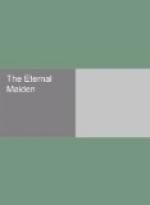When Annadoah awoke from her delirium of agony she saw that the wise woman had left her. The walls of the igloo sparkled as the flames of the lamp flickered. Over it a pot sizzled with walrus meat frying in fat. In her half-waking condition Annadoah realized that something lay by her, and turning, softly, she found a tiny, naked baby. Its skin was pale golden, its hair, unlike that of other babies, was of the color of the rays of the sun. With half-fearful gentleness she turned it over and over. Speechless with wonder, an inexplicable stirring in her bosom, she regarded its face—she observed its nose, the contour of its cheeks, the arrogance of its little chin; she noted in her child that curious and often brief resemblance of the new-born to the father—and this immediately recalled vividly and achingly the face of Olafaksoah. This was her child, and his. Surely, surely, with great joy she understood! With this thought, an impetuous longing for the father filled her. Passionately pressing the little creature to her breast she gave vent to the homesickness and ache of her heart in wild, convulsed sobs. The touch of the little one, the resemblance of its tiny face to that of the blond man—these brought back the old passion and longing in all their bitterness. Yet at the same time the child brought a new satisfying solace to her; it filled an immeasurable void in her heart. Now and again she held it from her, and suppressing her violent sobs, solemnly regarded its face. She could not get over the wonder and half-surprise that possessed her. With utter abandon she finally fiercely clutched it to her. The infant began to cry. Annadoah, with slow, cautious gentleness laid it down by her side, scared, amazed. Thereupon the baby for the first time opened its eyes. Annadoah leaned forward, gazing at it intently, wildly—then uttered a scream as though she had been stabbed to the heart.
When the wise woman—who had left Annadoah alone for a long sleep—returned to prepare food and to seek of the spirits the destined name of the child, she saw Annadoah lying still, her face upturned, tear drops glistening beneath her eyes. The wise woman placed some of the fried walrus meat, or seralatoq—the prescribed food for a mother the day her child is born—into a stone plate and put it on the floor within reach of Annadoah. Then she melted some snow and placed it by the couch. Slowly approaching the bed she lifted the naked infant.
“When thy mother wakes,” she muttered, “I shall call upon the spirits. I shall give thee the name they gave thee in the great dark ere thou earnest hither—the name which was born with thee and which shall be as thy shadow.”
As she laid the little creature by the unconscious mother she saw a strange and frightful thing. The curse! And thereupon she knew she would not be called upon to learn of the spirits any name for this unhappy child. It had, indeed, been named by the dead and with it the unuttered name must soon return to the great dark. With set lips, and the grim determination of duty on her face, she crept softly from the igloo.




